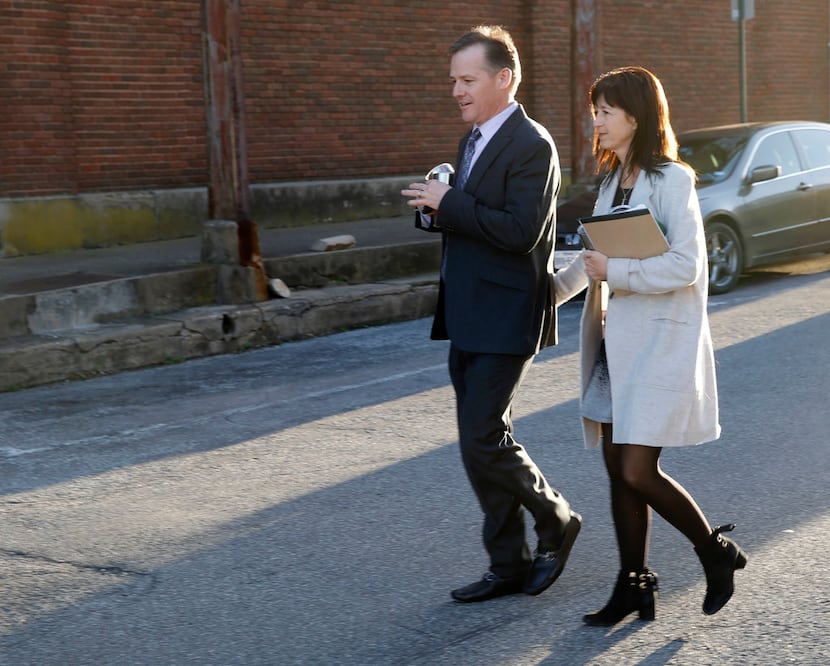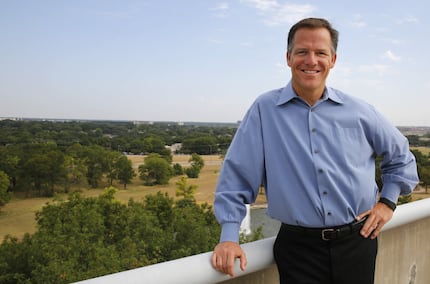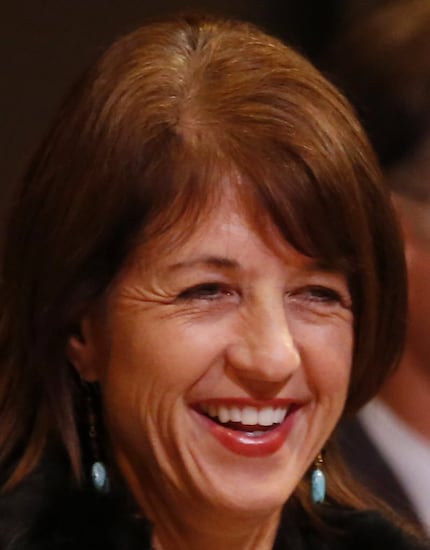After two trials and multiple appeals, a former Richardson mayor and her developer husband have begun serving their six-year sentences for bribery.
Laura and Mark Jordan were convicted by a North Texas jury in 2021 and sentenced the following year in a federal corruption case involving sex, money, adultery and betrayal.
They were allowed to remain free pending their appeal. The Fifth Circuit Court of Appeals upheld their convictions in October.
In late March, U.S. District Judge Amos Mazzant denied the Plano couple’s request for more time to attend their daughter’s high school graduation. He ordered them to report to prison no later than 2 p.m. on April 8.
Laura Jordan, 59, is serving her sentence in a medium-security prison in Marianna in the Florida Panhandle, near Tallahassee, according to the Bureau of Prisons.
Mark Jordan, 57, is almost three hours away by car in a medium-security prison in Montgomery, Ala.
Laura Maczka, as she was previously known, was a first-time Richardson mayor when she accepted a string of favors, some sexual, from wealthy developer Mark Jordan, who became her lover and then her husband, according to court records.
And she did what she could while on the City Council to make sure he got the zoning he wanted for his planned apartments despite vehement resident opposition, prosecutors said.
Defense attorneys framed the case as a love affair between two people who let their feelings for each other cloud their judgment and tarnish their ethical standards. The couple married in 2017 during the federal investigation — an act prosecutors called an orchestrated sham, intended to obscure what they called the real motive: greed and selfishness.
Mazzant said during the sentencing hearing that the jury decided the case was about bribery, not a love story. And he told the former mayor she abused her position of power.
The couple have asked the U.S. Supreme Court to review their case — a step they’ve acknowledged to be a long shot, court records show.
Attorneys for the Jordans could not be reached for comment.

The case spanned almost a decade and resulted in a city investigation and two salacious public trials. Mark Jordan sought to develop a prime plot of land in Richardson along U.S. Highway 75. Despite campaigning on a “no new apartments” platform, Laura Jordan quickly changed her mind about his Palisades apartments when the developer began romancing her and showering her with gifts.
That included at least a dozen trips to exotic locations, usually in fabulous accommodations overlooking the ocean. Laura also accepted $18,000 in cash, $40,000 by check, a Mercedes convertible and $24,000 in home renovations in exchange for her votes for his project.
The total value of the benefits she accepted from him but did not publicly disclose totaled more than $130,000, prosecutors said.
There also were intangible benefits, like his attention, affection and the sex they had in fancy hotels, prosecutors said. The Fifth Circuit has found that “sexual services” can constitute a “thing of value” under the law.
Love or friendship is not a defense to bribery as long as there is an intent to influence a vote, prosecutors said at the trial.
The public scandal has kept the city of Richardson from honoring its agreement with the Palisades developers for more than $45 million in city subsidies. Prosecutors said Laura Jordan helped Mark Jordan land the generous public grant.
Richardson City Manager Don Magner said Tuesday the City Council has not yet decided whether to begin paying the subsidy to the Palisades owners, who no longer include the Jordans.
Magner said the city decided not to make any payments until all Jordan criminal proceedings ended. He said city officials will meet with their legal team in the coming weeks to evaluate and discuss what to do about the economic development agreement.
“We will be quickly making some decisions regarding the next steps,” Magner said.
Owners of the Palisades property could not be reached for comment.
‘Surprise play’
In an October email Laura Jordan sent to her prayer group called “Team Jordan,” she asked for prayers and provided an update on the couple’s post-conviction legal strategy, court records show.
“We are at 4th and long at the end of the 4th quarter, but the good news is that we have a potentially game ending/winning play prepared for a final push to victory,” she said, according to prosecutors.
That “surprise play” turned out to be an unsuccessful attempt to win a new trial — or at least a hearing. Defense attorneys called it newly discovered evidence that a key government witness committed perjury during the trial.

“Ultimately, we pray for a mistrial, that this battle will end and we and our family can literally move on with our lives…outside of prison!” Laura said in the email to her supporters.
Assistant U.S. Attorney Sean Taylor in a November filing dismissed the defense’s perjury allegations, saying the Jordans presented no evidence the witness lied under oath.
“Even still, the Jordans refuse to accept responsibility for their crimes,” he wrote in his response. “In Laura Jordan’s own words, this latest motion is a ‘Hail Mary’ — a futile attempt to further delay serving the sentence this Court imposed.”
Gratuity or bribe?
In its decision on the Jordan appeal, the Fifth Circuit noted that Mark Jordan admitted to paying for votes.
His lawyers argued that his payments to Laura were at most gratuities, not bribes, to reward her for making him money.
The Jordans said no inappropriate relationship existed between them prior to Laura Jordan’s first vote on Mark Jordan’s development project. As a result, there was no prior quid pro quo agreement, meaning the giving of something of value in exchange for something else, according to the defense.
Existing case law says a gratuity, or a reward, without a quid pro quo agreement is not a crime under the federal bribery statute — a controversial finding about which the U.S. circuit courts disagree. The majority of circuit courts that have considered this question concluded that the law does cover corrupt gratuities as well as bribes.

The Supreme Court agreed to decide the matter and has begun hearing oral arguments in the case of a former Indiana mayor, James Snyder, who was convicted of accepting $13,000 in connection with the city’s acquisition of garbage trucks.
The Fifth Circuit rejected the Jordans’ argument about the absence of a quid pro quo between them.
“The record reflects evidence of ongoing communications between Mark and Laura long before the first vote that clearly indicate they were working together to get the project approved,” the ruling said.
Flirty emails
The bribery case scandalized the public and enraged Laura Jordan’s supporters in 2015 when the allegations first leaked.
“Laura told her friends on several occasions that she was at ‘mayor conferences’ when she was actually with Mark at a swanky hotel in a different city,” Mazzant wrote in an order.
Laura Jordan was elected to a two-year term as mayor in May 2013 after running on a platform that included opposition to apartments near homes. The Richardson mom, new to politics, quit her nonprofit job to avoid potential conflicts.

But she voted for Mark’s Palisades development despite her promises to oppose new apartments and despite intense opposition from hundreds of nearby homeowners, some who had been her friends, the government alleged.
She later told Mark in “flirty” emails that she was “taking bullets” for him at heated community meetings about his Palisades development and its apartments that people fought so hard against.
In total, she voted three times from 2013 to 2014 to approve his rezoning requests and also to allow the city to negotiate a $47 million reimbursement deal with him, prosecutors said.
Mark also gave Laura a job at his real estate company in March 2015 when she left the city, paying her a $150,000 salary and $15,000 signing bonus. The leasing agent she replaced earned $70,000 and was more qualified, court records show.
The case went to trial twice, each lasting about a month, because of unusual circumstances following the first verdict that led to a mistrial.
Mazzant ordered a new trial after the first conviction in 2019 when defense attorneys complained that a juror had been improperly influenced. It stemmed from a court security officer’s remark to try to calm the distraught and undecided juror hours before the verdict.
This post was originally published on this site be sure to check out more of their content.








